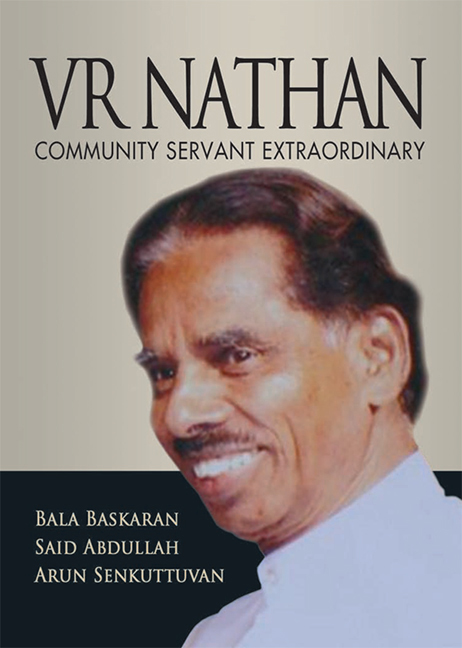Book contents
- Frontmatter
- Contents
- Foreword
- Message
- Preface
- Acknowledgements
- 1 VR's Inter-religious Leadership
- 2 An Immigrant who Made Good
- 3 Introduction to Temple Management Affairs
- 4 Invitation to Help out HEB
- 5 An Era of Change in HEB
- 6 VR's Signal Contribution to HEB's Transformation
- 7 Celebrating Hindu Festivals
- 8 Transforming the Temple Scene
- 9 VR's Views in Public Deliberations of Issues Affecting Indians
- 10 VR's Legacy
- Appendix
- About the Authors
- Plate section
2 - An Immigrant who Made Good
Published online by Cambridge University Press: 21 October 2015
- Frontmatter
- Contents
- Foreword
- Message
- Preface
- Acknowledgements
- 1 VR's Inter-religious Leadership
- 2 An Immigrant who Made Good
- 3 Introduction to Temple Management Affairs
- 4 Invitation to Help out HEB
- 5 An Era of Change in HEB
- 6 VR's Signal Contribution to HEB's Transformation
- 7 Celebrating Hindu Festivals
- 8 Transforming the Temple Scene
- 9 VR's Views in Public Deliberations of Issues Affecting Indians
- 10 VR's Legacy
- Appendix
- About the Authors
- Plate section
Summary
Veeraragavalu Chetty Renganathan, in short known as VR Nathan or merely as VR to friends, was born in Tiruvarur, the famous temple town of Tamil Nadu, on 27 October 1930. VR was raised in a family of humble origins with four other siblings. His father ran a jewelry shop and dealt in precious stones and gems imported from Burma and Ceylon. Business was poor. He could not make ends meet. Finally the shop was closed. VR's cousin, Devarajan, who had worked in the shop for a while migrated to Singapore.
VR studied hard and matriculated from the Tiruvarur Board High School with commendable results. He acquired a special aptitude for mathematics which stood him in good stead throughout his career. Eager to relieve the financial strain of his family, he tried to get himself recruited into the Indian Army without the knowledge of his parents, but was turned down as he was physically puny.
The school where he studied attained fame when another alumnus, M Karunanidhi, became the chief minister of Tamil Nadu in 1970. VR used to tell his family that as a fiery senior student Karunanidhi wrote poems in an exercise book and asked other students to read and sign. G Sarangapany (1903-1974), a social reformer and editor and publisher of Tamil Murasu, Singapore's longest established Tamil newspaper, was also a native of Tiruvarur and matriculated from the same school. Singapore had always held a magic charm for the coastal people of Tamil Nadu. VR, assisted by Devarajan, left his hometown for Singapore in 1951. When Devarajan first sailed to Singapore, it was VR's mother who had sold her gold chain to enable his passage.
In Singapore, Devarajan was working with the firm of S L Perumal, the son-in-law of the enterprising Singapore Harbour Board labour contractor Balaguru Govindasamy Chettiar. Devarajan used to take VR to Perumal's company where VR had an opportunity to have a cursory look at the ledgers and journals when he was whiling away his time and still looking for a job. VR realized that he had a flair for accounts and, before the advent of computing, his skill in mathematics, helped him in many ways. He was getting himself acquainted to a company environment but he politely declined a job offered by Perumal.
- Type
- Chapter
- Information
- VR NathanCommunity Servant Extraordinary, pp. 20 - 26Publisher: ISEAS–Yusof Ishak InstitutePrint publication year: 2012

